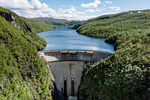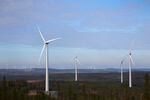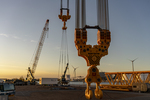News Release from DNV
Wind Industry Profile of
Energy security is top priority in the energy trilemma for 2023
Energy security concerns outweigh clean and affordable energy on the list of priorities for energy companies globally, as the industry says the energy system will not resolve the energy trilemma in the next decade, according to DNV’s research analysing the views of more than 1,300 senior energy professionals, based on a timely survey conducted during December 2022 and January 2023.
Energy security will take centre stage for oil & gas and power sectors in the year ahead. Renewables players are maintaining their clean energy focus, while the priorities of industrial energy consumers contrast with their suppliers and partners, as they prioritize accessible and affordable energy.
Just 39% of energy professionals are confident about meeting decarbonization and climate targets, yet progress in the energy transition is the greatest driver of confidence among energy professionals for the year ahead, and a majority believe the energy transition is accelerating.
Resolving the energy trilemma – delivering secure, clean, and affordable energy – is viewed by the energy industry as a long-term goal, according to Trilemma and Transition: The momentum to break barriers, the latest edition of DNV’s annual research on the outlook for the energy industry. Few in the industry (17%) believe the transition will deliver secure, clean, and affordable energy in the next decade, to all parts of the energy system in their country. Most (41%) see this being achieved in 10-20 years, while a sizable group (32%) believe this crucial outcome of the energy transition will not be realized until well into the 2040s. There is general agreement on this outlook across regions, with only energy professionals in North America being slightly more conservative on the timeline.
“The energy trilemma is in focus in 2023 as the energy system struggles on all three aspects. Russia’s invasion of Ukraine has reminded the world how fragile energy security can be; coal plants are being fired up while renewables projects come under pressure; and energy consumers are being pressed on the cost of energy,” says Ditlev Engel, CEO, Energy Systems at DNV. "The trilemma is also in transition. In a complex and difficult year for the energy industry, we see the trilemma leading to competing priorities. But in a decarbonized energy system, energy sustainability, affordability, and security actually all pull in the same direction, and the public and private sector can resolve the trilemma through a new approach to scaling and implementation.”
Some 80% of professionals in the renewables sector believe energy security concerns will lead to increased investment in renewables in the year ahead, while a majority (61%) from across the energy industry say their company can become more profitable by improving sustainability.
In contrast, a record year of profits for the oil and gas industry has redefined what acceptable profits look like for the sector. In 2022, 52% of oil and gas executives said that their organization would make acceptable profits if the oil price averaged USD40 to USD50 per barrel. For the year ahead, just 39% feel the same. Half of respondents from the oil and gas industry (53%) say that their organization will increase investment in gas in 2023, up eight percentage points year-on-year. Some 43% of the oil and gas industry expect to increase investment in oil, up nine percentage points. Oil and gas companies are slowing their shift into areas outside of core hydrocarbons businesses and holding back their focus on decarbonization compared to 2022.
In 2023, the energy industry as a whole expects to increase investment in clean energy sources and carriers. Half of energy professionals expect their organization to invest in low-carbon hydrogen/ammonia (52%), and similar proportions in wind (49%) and solar (46%). Over a third expect their organization to increase investment in carbon capture and storage. In enabling technologies, six in 10 say their organization is increasing investment in energy efficiency and digitalization, and half the industry is investing in energy storage technologies.
“The energy transition has accelerated through both a pandemic and an energy crisis, and this has left markets striving to keep up, across transmission and distribution systems, supply chains, permitting and licensing, financing, infrastructure, and the workforce,” says Engel. “In the year ahead, we may see a slowing in the scale-down of fossil fuels, but potentially also a slowing in the scale-up of clean energy – if barriers aren’t overcome. Governments and policymakers must step up and remove barriers to implementation, and everyone in the energy industry must push forward in the transition.”
DNV’s research finds signs that barriers could slow the pace of the energy transition in the year ahead, but momentum is building to break these barriers as societies increasingly feel the effects of climate and energy crises, and as bottle-necks become more acute in holding back progress.
There is strong agreement in the power sector about an urgent need for greater investment in the grid, while just a fifth in the renewables sector say current transmission capacity planning is sufficient to enable the expansion of renewables.
Three quarters of the energy industry says that supply chain issues are slowing down the transition, while less than half the industry (44%) expects a significant improvement in the availability of goods in 2023.
For the renewables sector, lack of policy/government support and permitting/licensing issues are the greatest barriers to growth, and a strong majority (88%) say accelerating permitting and licensing is critical to meeting climate goals.
Some 40% of energy companies globally are finding it increasingly difficult to secure reasonably priced finance for projects. Regionally, finance is easier to access for organizations in North America and Europe. By sector, almost half of power companies (47%) are finding it increasingly difficult to secure financing, and 62% of industrial energy consumers.
About the research
DNV’s Energy Industry Insights research – now in its 13th year – explores the confidence, sentiment, and priorities for the energy industry in the year ahead. Trilemma and Transition: The momentum to break barriers draws on DNV’s global survey of more than 1,300 senior energy professionals. This is complemented by a programme of in-depth interviews with leaders in the energy industry. It is developed and created by teams from DNV and FT Longitude (a Financial Times company).
The research was conducted during December 2022 and January 2023. Survey respondents were drawn from across the energy industry, spanning electrical power, renewables, oil and gas, industry specialists (e.g. in technology, finance or policy), and industrial energy consumers. The survey respondents represent a range of functions within the industry, from board-level executives to senior engineers.
- Source:
- DNV
- Author:
- Press Office
- Link:
- www.dnv.com/...
- Keywords:
- DNV, energy security, trilemma, clean, power, energy, energy system, decade, research, renewables























